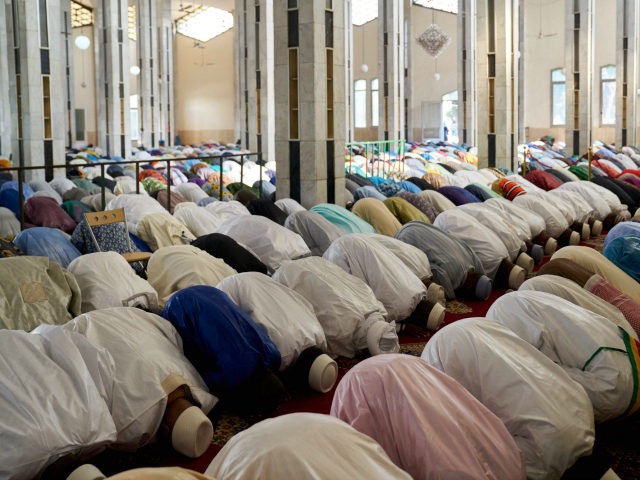Turkish President Recep Tayyip Erdoğan told attendees at an event Thursday that the government, and its Directorate of Religious Affairs (Diyanet) specifically, must do a better job of encouraging men and women to pray together at mosques, calling that segregation of sexes a “wrong taboo.”
Erdoğan was speaking at an event to observe “Mosques and Religious Officials Week,” a staple event in the country since 1986. He has adamantly encouraged women to take on homemaker roles and called birth control “treason” in the past, but in this case encouraged more women and children to come to mosques in the interest of advancing Islamic worship.
Turkey is a nominally secular state, established with strict separation of mosque and state under founder Mustafa Kemal Atatürk. Erdoğan and his Islamist Justice and Development Party (AKP) have used their power to significantly undermine this divide in the past decade, however, increasingly empowering Islamic voices in politics.
Thursday’s event featured a government call for more Turks to regularly attend mosques.
“It is my personal duty to encourage open discussion of all questions related to religion and mosques in this country,” the president said, according to Turkish newspaper Hurriyet. “Is there a verse or hadith [in the Quran] that bars women from going to mosques?”
“I have never heard of it or have read of such a thing. My tutors have never taught me anything like that. These false beliefs must be dispelled,” he continued. “There are mentalities that show this as Islam. But we need to get rid of these. These wrong taboos need to be destroyed now. And this needs to be done by the president of Diyanet. If the deputy president of Diyanet is currently a woman, that is a sign such taboos are being destroyed.”
Erdoğan insisted the government has a role in advancing Islam. “A society cannot maintain its existence if its ties to its civilizational values have been weakened just as is the case of a tree whose roots have been severed. Religion, wisdom, morality, and justice are load-bearing pillars that support us as a nation,” he contended.
He noted that if Turks are moving away from religion, he saw this as a fault on the part of the government.
“The language of sermons and khutbas should be updated, renewed and refined for youth to understand. Also, our religious officials should avoid otherizing and alienating expressions in all forms and kinds,” the president said.
He emphasized that every Turk must participate in mosque life, according to his point of view. “In my eyes, a mosque is empty without our children’s joy, our youth’s excitement, our elderly’s experience, our women’s grace and dexterity. If we are to build the future, we should encourage a mosque-centered life,” he said.
The Stockholm Center for Freedom adds that Erdoğan referred to the Diyanet as an “army” to be used in Islamic recruitment.
“From such an army we cannot get the results we expect. We should work more,” he reportedly said, adding that the Diyanet must encourage a “mosque-centric life.”
The Stockholm Center notes that Erdoğan’s language has changed little throughout his political career and has gotten him in trouble during more secular times in Turkish history. In 1998, Erdoğan was convicted of “inciting religious hatred” for reading a poem in public, which stated in part, “The mosques are our barracks, the domes our helmets, the minarets our bayonets and the faithful our soldiers.”
Some Christian groups have objected to Erdoğan’s remarks this week, given the increasingly hostile treatment of Christians in the country. The group International Christian Concern noted that, while Erdoğan emphasized the importance of Islamic religious life in mosques as social centers, “many Christians have repeatedly petitioned the government to allow them to open official churches and train their own pastoral leaders. Success has been minimal. Instead, the government under Erdoğan’s leadership has only increased its pressure on Christians.” In addition to preventing Christians from opening new houses of worship, Erdoğan’s government has increased the number of church seizures, limiting the ability of Christians to serve their communities and proselytize.
“The religious minorities in Turkey, like the Christians, Jews, and a few others, suffer from unequal treatment. … The religious minorities are believed to be enemies of the state,” Dr. Y. Alp Aslandogan, the executive director of the Alliance for Shared Values, said in remarks in March.
Erdoğan has openly admitted to wanting to increase the scope and influence of Islam in Turkish life, calling for a “pious generation” of Muslims to “work for the construction of a new civilization.” He has also publicly criticized Atatürk for reforms in language, consolidating the Turkish language into a Latin alphabet form and, according to Erdoğan, “attacking” it with “unpleasant, dull and soulless words” from Western languages.
Insulting Atatürk is a crime in Turkey, subject to up to three years in prison.

COMMENTS
Please let us know if you're having issues with commenting.